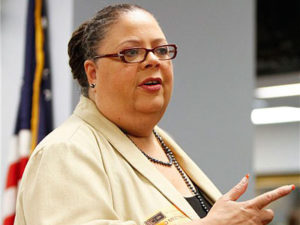
To effect positive change in urban education, we must first examine the agenda of would-be reformers who claim to have “magic bullet” solutions, Chicago Teachers Union President Karen Lewis said at an Elmhurst College lecture on April 15.
Lewis, a veteran teacher in the Chicago Public Schools who in 2012 led the city’s first teachers’ strike in 25 years, described the current state of education reform as the “juxtaposition of extreme wealth and extreme poverty.”
“People who claim to care about poor children are often extremely wealthy people,” said Lewis, speaking to a crowd of about 60 campus and community members as part of the College’s Andrew K. Prinz Guestship Lecture for Political Awareness.
Citing a “perfect storm” of education funding from business magnates such as Microsoft’s Bill Gates and Wal-Mart’s Walton family, Lewis charged that the nation’s elites are pushing privatization and business-like models for their own gain, concluding: “Whoever makes the rules makes it advantageous toward themselves.”
Lewis wondered aloud why the have-nots continue to accept a model that is clearly not designed in their favor.
“One question we never seem to answer is: What are the stories the winners tell the losers to get them to keep playing the game?” she asked.
False clichés continue to dominate the discussion about education, Lewis said, including the notion that people who work hard enough can overcome anything. Lewis argued that this kind of thinking ignores the truth of intergenerational poverty, which she called “a deep, intrinsic, unfortunate system” that has “kept many people in poverty” and perpetuated a belief that “those who are in this poverty deserve it.”
For many students in the Chicago Public Schools, she said, the problems of poverty are exacerbated by a systemic instability. “There are children in our school system who move every other week,” she noted, adding that 14 percent of the city’s children are homeless.
Last month, CPS announced plans to close 54 of the district’s schools in an effort to address the system’s financial problems, a move that Lewis said will only increase instability.
School serves as an important source of consistency for children who live in poverty, Lewis said. And when schools close or undergo a total staff replacement, “the children are yanked from what stability they know” and community ties are broken.
The school closing plan, an attempt to address the system’s academic and financial struggles, has become a hot-button issue that critics, including Lewis, have deemed racist and classist. Likening it to school vouchers and charter schools, Lewis called the plan a “magic bullet” approach that won’t solve their problems.
“It sounds great on paper, but it doesn’t work,” she said. Proponents of the plan argue that children from low-performing schools will be transferred to better ones. This is not always true, said Lewis, explaining that some children get moved to schools with even lower test scores.
In addition, she said, school closings can lead to safety issues for children who have to travel longer distances or cross gang lines to attend a new school. Some students, she said, drop out of school altogether rather than switch schools.
“We live in a city of Capulets and Montagues,” she added, noting one recent case where a parent from a closing school murdered a parent from a receiving school. “Our biggest safety concern isn’t a situation like Sandy Hook where someone is coming into the building. It’s when the kids walk to and from school.”
Lewis called on city and CPS officials to focus on rebuilding communities, not closing schools. “You cannot take education and schools out of their context,” she said. “We should invest in the entire city, not just the business district.”
She also had advice—and a warning—for future educators in the audience: “You cannot choose a more rewarding career. But if you want it, you have to fight for it because there are those who wish to destroy it.”
Still, Lewis remained optimistic about the fate of what she considers “snake oil” tactics such as tying student test scores to teacher evaluations. She also had a positive vision for the future of her school system, which she said was once “the crown jewel of public school systems.”
In order to reclaim that crown, she said, “We need to have an honest conversation about whether we’re willing to fight for public education everywhere.”
Lewis offered her vision of the ideal Chicago Public Schools system.
“It would have an elected, representative school board; it would have the funding required to do this job well; and it would have a government that is actually by the people and for the people,” she concluded. “It would be the democracy we all talk about but never really see.”